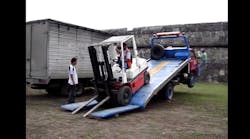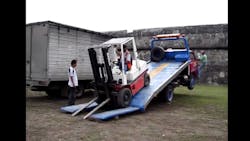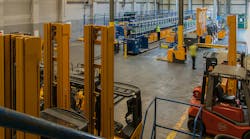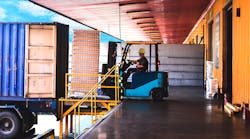The following online promo copy says all the right things to lure busy manufacturing or distribution managers with too few skilled workers to operate their forklifts:
Online Forklift Certification: Done in 1-2 hours! … Register: 10 minutes … Train Online: 60 minutes … Test Online: 15 minutes … Receive Certification: Automatically print a copy of your operator certification cards the instant your employee completes our online program. An original laminated card will be mailed within 5 – 7 days. … “It’s never been faster or easier to ensure that you get the proper forklift training and documentation necessary to meet OSHA standards.”
This hype gets David Hoover riled. He’s president of Forklift Training Systems, and he says such a come-on from online providers not only cheapens what he does for a living (in-person forklift operator and trainer training), but it makes hiring managers believe operating a forklift is as easy as logging on and watching a generic video or some PowerPoint slides. He can live with the insult to what he and his colleagues do in classrooms across the country, but he worries that the lives of operators and people working around them are put at risk by encouraging such a laissez-faire attitude.
“The fact that it is so fast and easy for a person with no prior experience to get a card saying they are certified should be scary to many of your readers,” he told me. “People are doing things in the training world that make them money but are unethical in my opinion and provide little true value.”
That may not sound scary to you, but there’s danger behind what these certificate mills and online courses are hawking. Hoover told me of a lawsuit which involved an operator whose poor skills and knowledge nearly killed a pedestrian. The operator logged in, reviewed an online presentation and took a written test. Actually he took it three times, failing the first two and finally passing the last time, after learning two sets of wrong answers. Anybody with the memory of an over-filled floppy disk could qualify to be a forklift operator under those circumstances.
“The company went down to the tune of seven figures in the lawsuit settlement, and the victim and his family will never be the same,” Hoover said. The bigger problem in Hoover’s mind is companies are looking for faster, cheaper and easier ways to get people behind the wheel while the concept of true “competency” is lost. It is not just what operators know that makes them safe, it is their attitude toward safety and if they are willing to apply what they know to their daily operation.
“Just last week we had an operator in class who refused to pay attention and had a generally bad attitude toward the training,” Hoover recalls. “We refused to certify him and we let his employer know they had a problem.”
A computer won’t do that. Neither will it see, hear or interact with a trainee before scoring his qualifications on specific equipment and at a specific site.
“Forklift certification is site and equipment specific,” Hoover reiterates. “Generic, one-size-fits-all training is unacceptable to OSHA.”
Whether an operator is a veteran or fresh out of school, they’ll require additional training once on the job. But to land that job, Hoover offers the following advice:
“Experienced operators need to accurately document their past driving experiences on their resume, including what they drove, where they drove it, when and for how long. Those with no experience should start with a non-driving job; then once they prove themselves they should ask their employer to certify them properly so they can move up within the company.”
As for employers, setting the stage for proper forklift training starts with asking the right questions, checking references and involving your in-house forklift trainers or safety people in the interview process. Doing your homework up front will be more time efficient than cleaning up the aftereffects of a cyber-trained human drone.
To see how some inventive film makers have dramatized the ugliness of those aftereffects, click here to go to our video gallery showcasing the consequences of "Bad Forklift Training Caught on Video."




